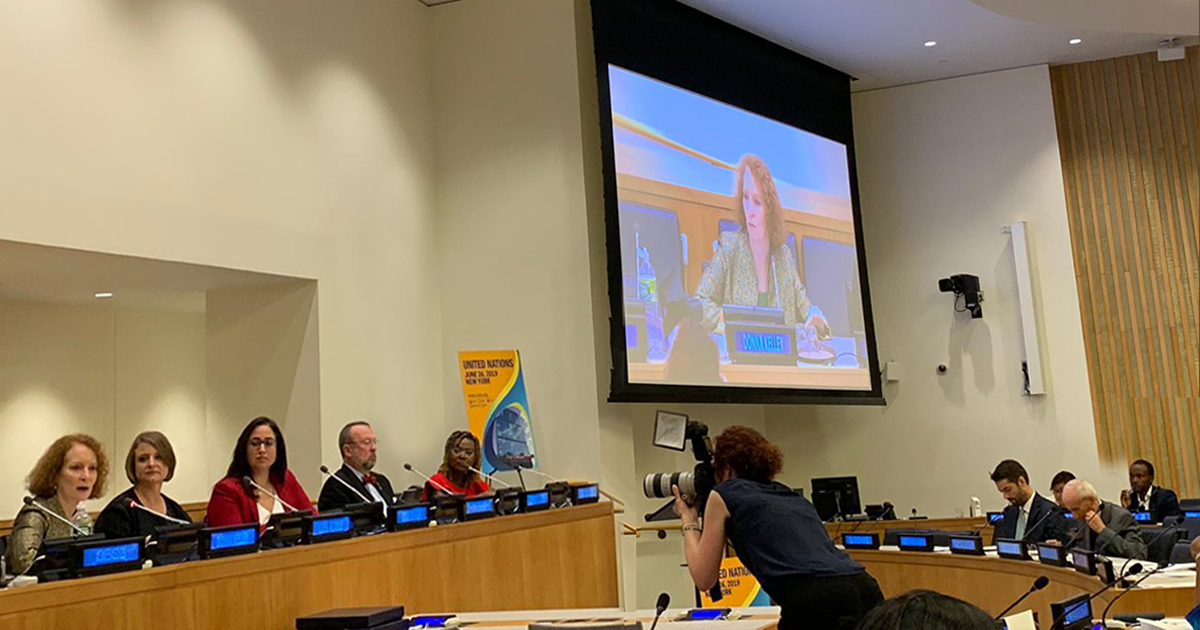Let’s Focus on Those Who Want to Start a Business, But Aren’t

Making entrepreneurship accessible to all is not just the right thing to do, it’s good for society. It promotes peace, contributes to economic development and stability, and enhances the wellbeing of people in multiple ways.
Acknowledging this, back in 2017, the United Nations General Assembly adopted a resolution that recognizes the crucial role Micro-, Small and Medium-Sized Enterprises (MSMEs) play in achieving the 2030 Agenda for Sustainable Development.
This year, the International Council of Small Business (ICSB) convened the entrepreneurship community at United Nations Plaza on June 27 for Micro-, Small and Medium-Sized Enterprises Day. Together, they focused on entrepreneurship and the potential of MSMEs to contribute to the Sustainable Development Goals (SDGs).
At the event, Babson College Professor Donna Kelley presented her related research, also featured as a chapter in the newly released ICSB Global Micro-, Small and Medium-Sized Enterprises Report.
In the report, Kelley focuses on the fact that certain demographics, and those with situation-induced characteristics, are more often than not dissuaded from pursuing entrepreneurship. This includes women, younger or older age groups, those with lower income or less education, veterans, migrants, refugees, and ex-convicts.
“Each economy around the world has its own distinct entrepreneurship profile,” said Kelley. “This profile reveals who in a society most frequently starts a business—and who does not.”
Policymakers, researchers, businesses, and other interested parties can examine their nation’s entrepreneurship profile, identify gaps, engage in dialogue with other countries on experiences and best practices, and design initiatives and policies that will address underserved populations and equalize participation in entrepreneurship.
Entrepreneurship in the Underserved Population
Written by Donna Kelley. An excerpt:
These underrepresented populations may benefit highly from entrepreneurial activity, particularly if they have few other work options, or if they have particular needs that entrepreneurship can accommodate.
Additionally, society benefits from their participation when they pursue opportunities that others do not see and when they are generators rather than consumers of income.
By identifying gaps in entrepreneurship, an economy can target its policies and programs toward a goal of making entrepreneurship accessible to everyone, and in so doing, boosting the health and development of its economy and the wellbeing of its people.
Women
Women rarely participate in entrepreneurship as frequently as men.
According to the Global Entrepreneurship Monitor (GEM), out of the 49 economies participating in the 2018 adult population survey, only six showed as many women as men entrepreneurs. In 13 of the economies, men were about twice as likely as women to be starting and running new businesses.
Yet, interestingly, according to GEM, women are, on average, as likely as men to believe there are good opportunities for starting businesses around them. However, women are only three fourths as likely as men to state they have the capabilities for entrepreneurship.
While this could reflect their experience and the disciplines they studied in school or college, it also might indicate less confidence, perhaps relative to what one believes they are up against in starting a business. Researchers also have pointed to lower access to financial capital as an impediment for women entrepreneurs.
Young and Older Age Groups
Many countries around the world exhibit very high youth unemployment rates. In some of these countries, like Greece, this may be motivating the high demonstrated youth entrepreneurship rates, while in others, it seems to have no effect, suggesting constraints or a lack of support for this age group.
In other economies, high entrepreneurship rates among the older age groups (for example, Saudi Arabia and the Republic of Korea) may suggest an opportunity or need among this age group. On the other hand, very low rates, especially compared to overall entrepreneurship levels, could indicate little opportunity or interest in this endeavor. Entrepreneurship can serve as a promising alternative for those who need to generate income in their late careers.
Situational Restrictions
People may find themselves in situations where employment is restricted or challenging for various reasons.
For example, those who have migrated to another country, perhaps in search of a better life, or refugees escaping violence, persecution or war, face an unfamiliar environment in their adopted homeland … they may find that their only employment alternatives are low skilled jobs. Entrepreneurship offers promise for this population in adjusting and settling in their new country, a means for generating income and a livelihood.
Veterans are another group that may find traditional employment less attractive or not feasible. On the other hand, starting a new business may allow them to leverage the skills they developed in the military: for example, their discipline, teamwork and leadership.
Additionally, ex-convicts are highly likely to reoffend. A 2014 Department of Justice study found that nearly 68 percent were rearrested within three years of their release. The Prison Entrepreneurship Program (PEP) in Houston, Texas, offers business skills training, mentoring, and other forms of support. Recidivism among those graduating from the program was reported at less than 10%.[1] Considering the harm to society of a repeat crime, in terms of safety and the cost of handling and housing convicts, it’s clear that entrepreneurship can provide, not only a source of income for the ex-convicts, but cost savings and greater security for an economy.
[1] Bobby Clark and Kim Potter-Blair. Entrepreneurship: Catalyst for Successful Reentry. Corrections Today. April/May 2011.






